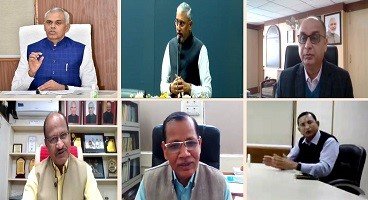ICAR and Bayer to drive sustainable Ag-tech adoption among smallholder farmers
The partnership aims to provide farmers agronomic solutions, crop protection, mechanization for Direct Seeded Rice, and precision tools for water-positive practices.
Indian Council of Agricultural Research and Bayer, a Global enterprise with core life science and agriculture competencies, have recently signed a Memorandum of Understanding (MoU) for the technological advancement of farmers through Krishi Vigyan Kendras. The partnership aims to improve farmers’ livelihoods by providing them with agronomic solutions, crop protection, mechanization for Direct Seeded Rice, and precision tools for water-positive practices. The workshop was organized by ICAR-KVK, Karnal, at the ICAR-National Dairy Research Institute, Karnal under the Chairmanship of Dr. U.S. Gautam, Deputy Director General, (Agricultural Extension) Divison of Agricultural Extension (ICAR). Dr. Gautam spoke about reimagining the rice cropping in view of the renewed focus on reducing water and carbon footprint in agriculture under Vikshit Bharat initiatives. He further stated that the ICAR-Bayer collaboration is a unique Public-Private-Peasant-Participation (P-P-P-P) initiative that allows ICAR-KVKs and farmers to select and practice the most productive varieties and technologies, aiming to synergize efforts, scale adoption, and ensure sustainable food production for the future.
Dr Dheer Singh, Director ICAR-NDRI Karnal, Dr. R. R. Burman, Assistant Director General (Agricultural Extension) ICAR, Dr. J. P. Mishra, Director, ICAR-ATARI Zone-II, Jodhpur, Dr Parvender Sheoran, Director, ICAR-ATARI Zone-I, Dr. Sangeeta Dawar, Lead Govt Affairs, Bayer, Dr. Ajeet Chahal, Rice Platform Lead, Bayer, and Simon Wiebusch, President, Bayer South Asia along with their team of expert, were also present during the workshop.
The ICAR-KVKs will provide farmers with on-ground assistance for sustainable agriculture and mechanization solutions, aiming to increase their knowledge and awareness of sustainable practices. By enabling them to join carbon credit markets, they can create more income streams and contribute to environmental conservation efforts. The DSR demonstrations will be organized at 46 KVKs spread across 8 States viz., Haryana, Punjab, Uttar Pradesh, Jharkhand, Odisha, Madhya Pradesh, Chhattisgarh, and Maharashtra during Kharif 2024.
The partnership aims to provide farmers agronomic





